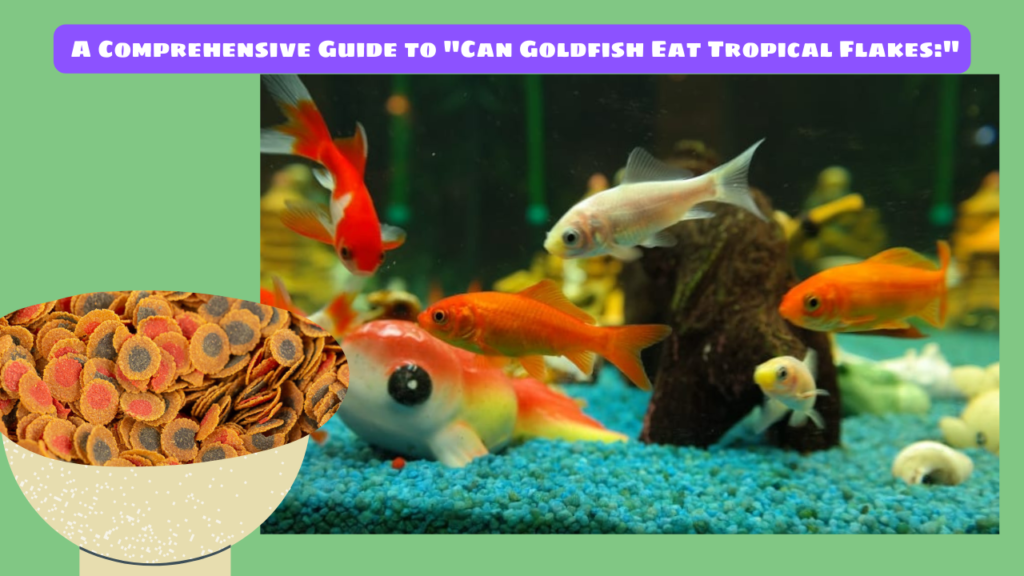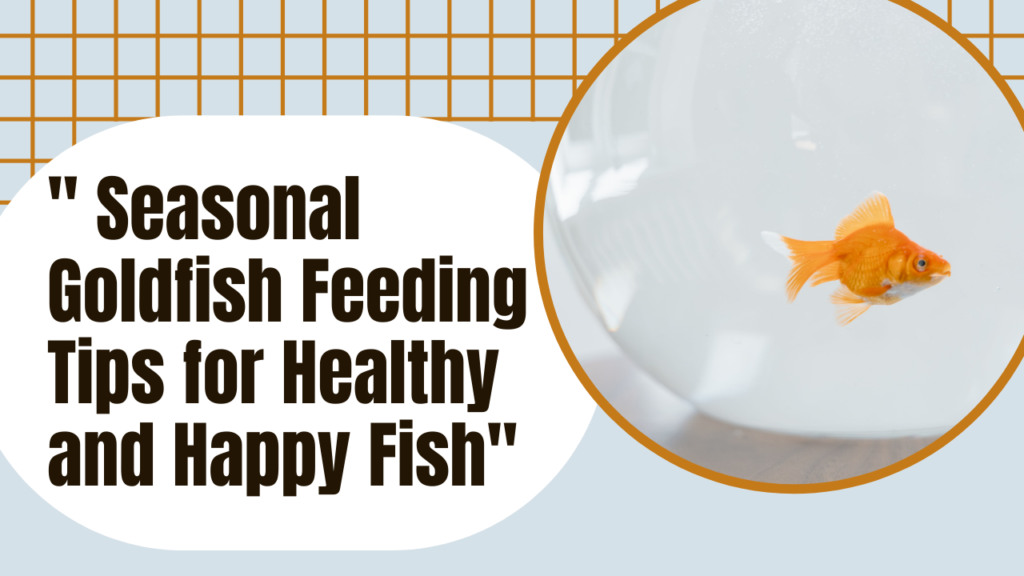It is both straightforward and complex to answer this question Can Goldfish Eat Tropical Flakes? Although goldfish can indeed consume tropical flakes, it is crucial to grasp the complete picture.
Even though goldfish are known to be omnivorous, they have different nutritional requirements than tropical fish. They might not get the best nourishment for long-term health if you only give them tropical flakes frequently. We must delve deeper into the nuances of the goldfish diet and the elements of tropical flakes to fully comprehend this.
Table of Contents
Understanding Goldfish Diet
This article will help you to understand the diet and nutrition part of the diet of goldfish. Let’s dive into Can Goldfish Eat Tropical Flakes . Understand the needs of goldfish’s daily diet. To truly understand how to care for our beloved goldfish, we must first take a glimpse into their natural habitat and diet.
Explaining the Natural Diet of Goldfish in the Wild
Goldfish usually eat aquatic plants, algae, small insects, and even crustaceans in their natural environments, which include East Asian lakes, ponds, and rivers with slow currents. With such a wide variety of food options, goldfish are guaranteed a healthy diet that is high in both plant matter and proteins.
For their digestive health, they must consume plant material in the form of water plants and algae. It offers vital nutrients and fiber that promote their general health. This natural diet is important to take into account when caring for goldfish in captivity since it helps to maintain their vivid colors and strong health.
Discussing the Importance of Replicating this Diet in Captivity
Understanding the natural diet of goldfish in the wild has allowed us to see how crucial it is to mimic that diet in captivity. When kept in ponds or aquariums, goldfish are fully dependent on their keepers to supply them with the food and nutrition they need to survive.
It is crucial to closely resemble goldfish’s natural diet to preserve their longevity and good health while in captivity. Offering a mix of live/frozen brine shrimp, daphnia, and aquatic plants and vegetables like peas and spinach along with protein-rich sources like premium goldfish pellets is necessary for accomplishing this.
Can Goldfish Eat Tropical Flakes? .Lack of a diet that meets their natural nutritional needs can cause several health issues, such as digestive disorders, poor growth, and reduced lifetime. Thus, a key component of good goldfish care is understanding the wild diet of the goldfish and replicating it in a controlled environment.
In conclusion Can Goldfish Eat Tropical Flakes? , each goldfish owner needs to understand the natural diet of goldfish and the significance of replicating this diet in captivity. We can make sure that our goldfish thrive and exhibit their vivid colors and fun personalities to the maximum degree by providing a balanced diet that blends plant-based and protein-rich foods. This knowledge prepares the ground for additional investigation into their dietary needs, including whether tropical flakes meet their dietary requirements, something that we shall explore in the sections that follow.
What Are Tropical Flakes?
An answer to Can Goldfish Eat Tropical Flakes ?
Definition of Tropical Flakes as Fish Food for Particular Fish Species
Tropical flakes are a unique kind of fish food manufactured to meet the dietary needs of particular fish species, especially tropical fish. These flakes have been carefully designed to meet the particular dietary needs of fish that are frequently kept in tropical aquariums. They are essential for caring for tropical fish, but it’s important to realize that their nutritional requirements are very different from those of goldfish.
Explaining Their Typical Ingredients and Purpose
Tropical fish often consume flakes made of a combination of components that have been carefully selected to enhance their health and vitality. Fish meal, shrimp meal, spirulina, different grains, and essential vitamins and minerals are frequently found in these products. To meet the preferences and nutritional needs of tropical fish species, the combination strives to offer a well
To support tropical fish’s growth, brilliant colors, and general well-being, tropical flakes are designed to offer a full and balanced nutrition source. They are made to float on top of the water, making it simple for fish to devour them.
Tropical flakes are excellent at providing for the dietary requirements of tropical fish, but it’s important to keep in mind that they are made specifically for these species. We will investigate if these particular flakes are appropriate for goldfish diets, which have specific dietary requirements and preferences, as we continue our investigation.
The Nutritional Content of Tropical Flakes
Detailing Common Ingredients in Tropical Flakes Tropical flakes are specifically prepared to meet the dietary requirements of several tropical fish species. Tropical flakes frequently contain the following ingredients:
- Fish Meal:
Often the primary ingredient, it provides essential proteins that tropical fish require for growth and muscle development.
A protein-rich powder called fishmeal is created by processing fish like anchovies, sardines, or herring. A rich source of protein for a variety of uses, especially as an additive to feed in agriculture and aquaculture, the usual components include these fish, which are boiled, dried, and ground into a fine powder.
- Shrimp Meal: Adds diversity to the protein sources, enhancing the flavor and nutritional profile of the flakes.
Protein-rich shrimp meal is a byproduct of processing shrimp. Shrimp, which are boiled, dried, and pulverized into a fine powder, make up the majority of shrimp meal. It is an important source of protein for poultry, livestock, and aquatic animals like fish and shrimp. It is also used in animal feed.
- Spirulina: A type of algae rich in essential nutrients, it contributes to vibrant colors and overall health.
- Grains: Various grains like wheat, soy, and corn provide carbohydrates for energy.
As a source of carbohydrates and energy, grains including corn, wheat, and soybeans are frequently used in fish feed. To make balanced fish diets, these grains are processed and combined with additional substances. They contribute crucial nutrients, promote growth, and are a crucial component of the aquaculture sector to guarantee the well-being and growth of farmed fish.
Highlighting Nutritional Differences Compared to Goldfish Food
Can Goldfish Eat Tropical Flakes
Tropical flakes are excellent at satisfying the nutritional requirements of tropical fish, although they differ significantly from goldfish meals in terms of nutrition. When compared to tropical fish, goldfish have unique dietary needs that must be met:
Higher Plant Matter: As omnivores, goldfish have a higher requirement for plant matter in their diet. Tropical flakes often have fewer components from plants.
Less Protein: Compared to tropical fish, goldfish require less protein. Protein in excess might cause health problems in goldfish.
Levels of carbohydrates: Goldfish benefit from a diet high in carbohydrates; tropical flakes place less of an emphasis on this.
Fiber Content: Goldfish require fiber, which is typically absent in tropical flakes, from sources such as aquatic plants.
In conclusion, tropical flakes may not meet the nutritional needs of goldfish even though they are ideal for the dietary requirements of tropical fish. When deciding whether goldfish can consume tropical flakes without endangering their health and well-being, it is essential to comprehend these distinctions.
Can Goldfish Eat Tropical Flakes?
Tropical flakes are digestible by goldfish but are not the ideal option for their diet. Tropical flakes cannot include all the nutrients required for goldfish because they are made for various kinds of fish. To ensure the health and well-being of goldfish, it is advised to offer them a food customized to meet their nutritional needs.
Discussing Advantages and Positive Aspects
Feeding tropical flakes to goldfish can offer a few potential benefits:
- Variety in Diet: Tropical flakes introduce novelty to their diet, which can stimulate their interest in food. Some goldfish may find the taste of tropical flakes appealing.
- Nutritional Diversity: While not tailored to goldfish, tropical flakes do contain a mix of proteins, vitamins, and minerals. Occasional consumption can add diversity to their diet.
- Convenience: Tropical flakes are readily available in pet stores and convenient to use. They can serve as a backup option when other foods are unavailable.
- Interest and Engagement: Providing tropical flakes as an occasional treat can keep goldfish engaged during feeding times, making it an enjoyable experience for both the fish and the owner.
Emphasizing Moderation and Occasional Use
It’s important to stress that, despite the possibility of benefits, feeding tropical flakes to goldfish should only be done occasionally as a treat. Foods designed specifically for goldfish can best satisfy their unique nutritional needs. When people rely too heavily on tropical flakes, it might cause nutritional imbalances that affect their long-term health.
In conclusion, while feeding tropical flakes to goldfish may have some benefits, it’s important to utilize them carefully and with caution. To maintain the health and vitality of goldfish, a balanced diet catered to their particular nutritional requirements should continue to be the major priority.
- Risks and Considerations
- List potential risks associated with feeding goldfish tropical flakes.
- Explain why a balanced diet is crucial for goldfish health.
Risks and Considerations
While feeding goldfish tropical flakes is possible, it’s important to be aware of potential risks
- Nutritional Imbalance: Tropical flakes may lack certain nutrients that goldfish require in their diet, potentially leading to deficiencies.
- Digestive Issues: Goldfish may struggle to digest certain ingredients found in tropical flakes, which can result in digestive discomfort.
- Overfeeding: Tropical flakes can be enticing, leading to overfeeding if not used in moderation. Overfeeding is a common problem that can harm goldfish health.
The Crucial Role of a Balanced Diet for Goldfish Health
Maintaining a balanced diet for goldfish is essential for their health and well-being. Here’s why:
Nutritional Requirements: Goldfish have specific dietary needs, including a higher proportion of plant matter in their diet compared to tropical fish. A balanced diet ensures they receive the right nutrients.
Digestive Health: Proper nutrition supports healthy digestion, reducing the risk of digestive issues and buoyancy problems.
Vibrant Colors and Longevity: A balanced diet contributes to vibrant colors and a longer lifespan for goldfish, showcasing their full potential.
In conclusion, although feeding goldfish tropical flakes carries some possible hazards, those risks can be reduced by eating a balanced diet that is specially formulated to meet the nutritional requirements of goldfish. It’s critical to put their health and well-being first by supplying the appropriate nutrients in the appropriate amounts.
Alternative Foods for Goldfish
Commercial Fish Food: Goldfish-specific commercial fish flakes or pellets of the highest caliber offer vital nutrients.
Live or Frozen Foods:
For a protein boost, occasionally serve delicacies like brine shrimp, daphnia, or bloodworms.
Sliced peas, blanched spinach, and cucumber are wonderful plant-based food choices. Fresh vegetables.
Fruits:
Oranges and grapes, in moderation, can be eaten as snacks on occasion.
Homemade Fish Food:
Gelatin and a combination of wholesome items can be used to produce homemade fish food.
To keep them healthy and content, don’t forget to feed them in moderation and change up their food.
Introducing Tropical Flakes to Your Goldfish
When introducing tropical flakes to your goldfish, follow these steps for a safe and balanced approach:
- Choose High-Quality Flakes:
Select quality tropical flakes designed for their nutritional needs.
- Start Small:
Begin with a small portion to gauge their response and prevent overfeeding.
- Soak the Flakes:
To aid digestion, consider briefly soaking the flakes in aquarium water before feeding.
- Monitor Consumption:
Observe how much your goldfish eat. Remove any uneaten flakes to maintain water quality.
- Alternate with Goldfish Food:
Use tropical flakes as an occasional treat, not their primary diet.
- Gradual Introduction:
Introduce tropical flakes gradually, alongside their usual diet, to minimize digestive issues.
- Moderation is Key:
Emphasize moderation to ensure your goldfish’s nutritional balance and overall health.
By adhering to these rules, you can provide tropical flakes to your goldfish safely and add diversity to their diet while putting their health first.
Conclusion
Can Goldfish Eat Tropical Flakes?
Goldfish, with their vivid colors and active identities, have particular dietary needs that are influenced by their environment. The cornerstone of appropriate goldfish care is an understanding of their natural diet, which is abundant in aquatic plants, insects, and algae.
A delicious choice for varying the diet of your goldfish is to feed it tropical flakes, which are created for particular fish species. Although they can occasionally be given to goldfish, it’s important to use restraint and give priority to their primary food, which is suited to their nutritional requirements.
We’ve also talked about the potential advantages of including tropical flakes in your goldfish’s regular diet, focusing on diversity and interaction.
However, it’s critical to be aware of any hazards, including nutrient imbalances and digestive problems, that could result from relying too heavily on tropical flakes.
We’ve provided an alternate food list for your goldfish’s well-being, including live/frozen alternatives, fresh vegetables, and goldfish pellets, to ensure a balanced and nourishing diet.
We’ve offered step-by-step advice for safe and balanced feeding when introducing tropical flakes to your goldfish, emphasizing the significance of moderation and progressive inclusion.
In conclusion to can goldfish eat tropical flakes, keeping a balanced and customized diet is essential to your goldfish’s health and vitality, even though tropical flakes can be a delicious addition to their diet. You may give your goldfish the finest care possible by adhering to the recommendations in this manual, ensuring they continue to amaze and flourish.
FAQs
Following are some often-asked inquiries about Can Goldfish Eat Tropical Flakes?:
Are tropical flakes suitable for all types of goldfish?
Not all varieties of goldfish respond well to tropical flakes. They might be deficient in certain nutrients needed by particular varieties of goldfish. Prioritize feeding your goldfish food that has been specially made to meet their demands.
How often should I feed my goldfish tropical flakes?
Goldfish should not receive tropical flakes on a regular basis. To achieve regularly void nutritional imbalances, limit their consumption.
Can goldfish survive on nothing but tropical flakes or can goldfish eat tropical flakes?
Although tropical flakes are theoretically a food that goldfish can consume, doing so is not advised. To grow, goldfish need a variety of foods, and tropical flakes might not have all the nutrients they require.
What are some signs that my goldfish is not like the tropical flakes?
Spitting out tropical flakes, refusing to eat them, or even nibbling them might all be indicators of disinterest. It’s wise to look at alternative feeding methods if your goldfish exhibits these habits regularly.
Is it necessary to soak tropical flakes before feeding them to goldfish?
Although it is not necessary, soaking tropical flakes can help with digestion, making them simpler for goldfish to eat. It’s a useful technique, especially for fish that have trouble gulping down dry flakes.


